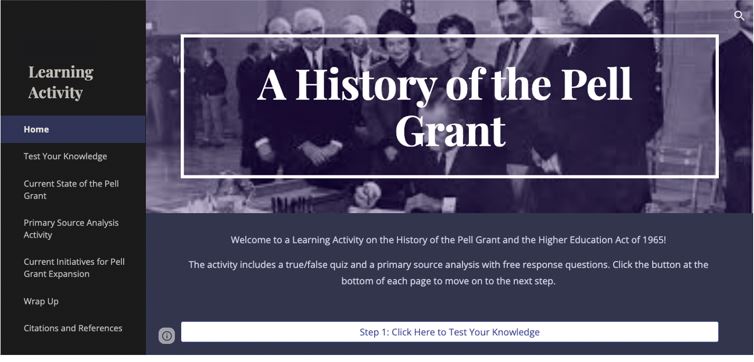The Council for the Advancement of Standards in Higher Education lists the History of Higher Education as an important core course that provides students the opportunity to bridge practice and theory. However, the class is rarely taught by historians and often lacks a focus on the historical thinking, research, and digital literacy skills necessary for a clear-eyed understanding of the higher education landscape.
This dilemma was on the mind of historian Kelly Schrum, Professor, Higher Education Program, and Affiliated Faculty in the Department of History and Art History at Mason. It also concerned her colleague in the Higher Education Program at Virginia Tech, Assistant Professor, Chase Catalano. Together, via an initial 4-VA Collaborative Research Grant in 2020-2021, they wanted to integrate those missing skills into the class with the hope of increasing research opportunities and creating a valuable open educational resource (OER).
The project, launched during the pandemic, consisted of students at Mason and VT working together and in parallel to learn about the history of higher education while developing historical thinking and research skills.
The project was a great success. “The student-created asynchronous learning activity assignment worked very well, and fostered a true collaboration across our institutions,” said Schrum. In addition to the learning activity assignments, students and faculty contributed to a website, higheredhistory.gmu.edu; piloted a primary source learning activity in two different higher education graduate courses during Fall 2020; and expanded the project to a third course in Spring 2021.
Schrum, Catalano, and Sophia Abbot, a doctoral student at Mason, grew this work into a larger research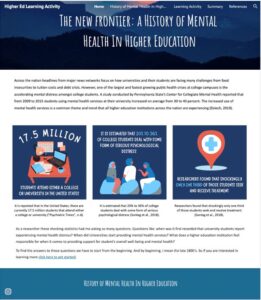 project on teaching and learning the history of higher education. Thirty-five students agreed to share their work for analysis and 24 were interviewed after completing the course. The survey and interview data made clear that students appreciated the value and relevance of studying the history of higher education for both their curricular and professional goals. One student explained, “We were able to take what we learned in the course and apply it to the project in a way that was very effortless, and that really helped me think about history in a different way.”
project on teaching and learning the history of higher education. Thirty-five students agreed to share their work for analysis and 24 were interviewed after completing the course. The survey and interview data made clear that students appreciated the value and relevance of studying the history of higher education for both their curricular and professional goals. One student explained, “We were able to take what we learned in the course and apply it to the project in a way that was very effortless, and that really helped me think about history in a different way.”
The group presented their initial findings at the Conference on Higher Education Pedagogy in February 2021 which were very well received. They then began talking with colleagues around the commonwealth at William & Mary, James Madison University, and Old Dominion University. Their shared interest in improving history of higher education courses prompted Schrum to apply for an extension and expansion of the Collaborative Research Grant. Schrum’s co-PIs at the partner schools requested 4-VA Complementary Grants at their institutions allowing continued work together with a wider lens.
The expansion grant enlarged the initial team to include Assistant Dean for Undergraduate Education Ben Boone of W&M; Art Dean, Executive Director for Access and Inclusion, JMU; Kim Bullington, ODU’s Adjunct Assistant Professor, Educational Foundations and Leadership; and ODU’s Director of Community Outreach & Engagement, Bill Nuckols.
In addition to Abbot, key Mason student scholars on the project included graduate students Allison Loughry and Alicia Ellis, and undergrads Sodaba Azamy and Kelly Tcheou. These students contributed to research, website development, and publications.
The 4-VA extension grant had four key components: 1) collaborate with 4-VA institutions to improve teaching and learning about the history of higher education, and to teach a shared digital assignment;2) expand OER resources on the history of higher education in the United States to provide primary sources, secondary sources, and a database of college and university archives; 3) conduct research on how the history of higher education is taught nationally; and 4) conduct Scholarship of Teaching and Learning research on how students learn historical thinking skills and digital skills as they create asynchronous learning activities on this subject.
With the expansion grant in hand, the Mason, Tech, W&M, and JMU faculty members taught the shared assignment in Fall 2021. Students also explored asynchronous primary source learning activities created by students at all four institutions. ODU taught the shared assignment in Summer 2022. Students at ODU explored primary source learning activities created by students at the other institutions and then developed additional resources which will be shared across institutions in future semesters. Between the five institutions, more than 100 students built individual asynchronous primary source learning activities. Selected activities are publicly available at https://sites.google.com/view/history-of-higher-ed/learning-activities-examples.
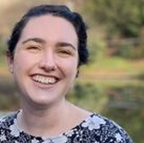
Explains Abbot, “I developed countless skills while collaborating on this project: from deepening my own understanding of the history of higher education and the value of primary sources, to engaging students in authentic, student-driven, project-based assignments. I’ve been inspired by the historical research students have done through this cross-institutional assignment, especially on Virginia institutions—uncovering stories that are rarely told in commonly assigned texts and expanding their understanding of the colleges and universities within which they operate,”
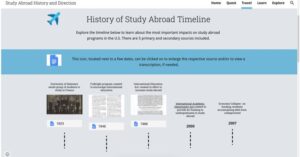 Each school contributed OER materials for the website. In addition to primary and secondary sources, the website now contains a database of institutional archives with digitized content, including yearbooks. Thanks to the two undergraduate research assistants, Azamy and Tcheo, over 700 institutional archives were cataloged on the site, including 48 Hispanic-serving institutions (HSIs), 24 historically black colleges and universities (HBCUs), and 15 women’s colleges. Additionally, the list includes 63 community colleges which is especially important given the lack of attention to these institutions historically.
Each school contributed OER materials for the website. In addition to primary and secondary sources, the website now contains a database of institutional archives with digitized content, including yearbooks. Thanks to the two undergraduate research assistants, Azamy and Tcheo, over 700 institutional archives were cataloged on the site, including 48 Hispanic-serving institutions (HSIs), 24 historically black colleges and universities (HBCUs), and 15 women’s colleges. Additionally, the list includes 63 community colleges which is especially important given the lack of attention to these institutions historically.
Azamy and Tcheo have also reviewed and analyzed 70 course syllabi submitted by History of Higher Education instructors across the U.S. They prepared a summary report of common readings and course topics. Their findings supported several academic articles now underway addressing how these courses are typically structured and taught. Their work, along with that of Loughry, also supported a grant proposal submitted to the National Endowment for the Humanities (NEH) Institute for Higher Education Faculty program.
The team credits the 4-VA grant for allowing members to do the diligent research necessary to create these important resources.
 “This 4-VA project fostered meaningful and lasting collaboration across five Virginia institutions. While each university approached the history of higher education course from its own perspective, we were able to work together on a shared assignment that allowed for a rich learning experience among faculty and students across campuses. The results speak for themselves!” – Kelly Schrum, Professor, Higher Education Program, Affiliated Faculty, History and Art History, Mason
“This 4-VA project fostered meaningful and lasting collaboration across five Virginia institutions. While each university approached the history of higher education course from its own perspective, we were able to work together on a shared assignment that allowed for a rich learning experience among faculty and students across campuses. The results speak for themselves!” – Kelly Schrum, Professor, Higher Education Program, Affiliated Faculty, History and Art History, Mason
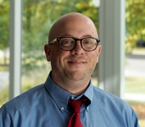 “I sincerely appreciated having an opportunity to collaborate with colleagues across the state for this 4-VA project. Through our conversations and research, I developed new pedagogical approaches that benefited students and deepened my thinking about the history of higher education.”
“I sincerely appreciated having an opportunity to collaborate with colleagues across the state for this 4-VA project. Through our conversations and research, I developed new pedagogical approaches that benefited students and deepened my thinking about the history of higher education.”
– Chase Catalano, Assistant Professor, Higher Education, VT
 “We really enjoyed being part of this effort to expand student research on the history of higher education. Everyone came away from this project with a deeper understanding of how important it is to develop critical thinking skills and to look beyond our own institutions.”
“We really enjoyed being part of this effort to expand student research on the history of higher education. Everyone came away from this project with a deeper understanding of how important it is to develop critical thinking skills and to look beyond our own institutions.”
– Ben Boone, Assistant Dean for Undergraduate Education, W&M
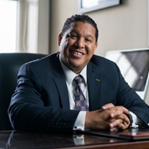 “The website, which holds a treasure trove of student research and engagement from a wide range of institutions, will be invaluable as we move ahead in studying the complex and influential histories of American higher education.”
“The website, which holds a treasure trove of student research and engagement from a wide range of institutions, will be invaluable as we move ahead in studying the complex and influential histories of American higher education.”
– Art Dean, Executive Director for Access, and Inclusion, JMU
 “When this asynchronous learning project was first introduced to the students, they were thrilled at the thought of not having to write a 20-page paper, however in the end, they did more work doing research on their chosen subject. They enjoyed this project because it allowed them a space for research and reflection, and it taught them how to create an interactive learning environment in an asynchronous environment. Being able to evaluate and participate in the projects created by other students in other universities across Virginia also taught them about their peers’ projects, too.”
“When this asynchronous learning project was first introduced to the students, they were thrilled at the thought of not having to write a 20-page paper, however in the end, they did more work doing research on their chosen subject. They enjoyed this project because it allowed them a space for research and reflection, and it taught them how to create an interactive learning environment in an asynchronous environment. Being able to evaluate and participate in the projects created by other students in other universities across Virginia also taught them about their peers’ projects, too.”
– Kim Bullington, Adjunct Assistant Professor, Educational Foundations and Leadership, ODU
Outcomes:
Scholarly Conference Presentations
Catalano, C. & Hernandez, R. (2022, March). Why do we teach history? Instructor and student perspectives. ACPA-College Student Educators Conference, St. Louis, MO, United States.
Schrum, K., Abbot, S., & Catalano, C. (2022, January 6-9). History of Higher Education: Students Making Sense of Primary Sources by Designing Asynchronous Learning Activities [Poster]. American Historical Association, New Orleans, LA, United States.
Abbot, S., Schrum, K., & Catalano, C. (2021, November 13-15). Teaching Historical Thinking to Higher Education Graduate Students [Poster]. Southern Association for College Student Affairs, Norfolk, VA, United States.
Abbot, S., Schrum, K., Hernandez, R., Fong, W. L., & Loughry, A. (2021, October 26-29). Designing Digital Activities for Authentic Learning [Panel, Virtual]. International Society for the Scholarship of Teaching and Learning Conference.
Schrum, K. & Abbot, S. (2021, September 20-24). On-Demand: Engaging students online through a peer-to-peer asynchronous teaching assignment [On-Demand Presentation, Virtual]. Innovations in Teaching and Learning, Fairfax, VA, United States.
Abbot, S. (2021, September 20-24). SoTL Showcase [Panel, Virtual]. Innovations in Teaching and Learning, Fairfax, VA, United States.
Abbot, S., Schrum, K., & Catalano, C. (2021, February 3-5). Graduate Students Learning and Teaching History through Asynchronous Activities [Poster session, virtual]. Conference on Higher Education Pedagogy, Blacksburg, VA, United States.
Publications
Catalano, D., Schrum, K., Fay, E., & Abbot, S. (forthcoming, 2023). ‘I can learn from the past’: Making the history of higher education relevant through social justice education pedagogy. The History Teacher.
Loughry, A., Abbot, S., Schrum, K., & Catalano, D. (forthcoming 2023). Developing digital skills through a student-facilitated asynchronous learning activity. The Journal of Interactive Technology and Pedagogy.
Schrum, K., Abbot, S., Loughry, A., & Catalano, D. (forthcoming 2024). “I wanted to know!”: Engaging learners in the history of higher education through an authentic digital assessment. The History Teacher.
Schrum, K, Abbot, S., Fay, E., Loughry, A., & Catalano, C. (in process). Teaching historical thinking through the history of higher education.
External Funding
“Unpacking the History of Higher Education in the United States.”
National Endowment for the Humanities (NEH) Institute for Higher Education Faculty award.
Provost’s Graduate Student Travel Grant (January 2022)
American Historical Association Travel Grant (January 2022)
Southern Association of College Student Affairs Travel Grant (November 2021)

